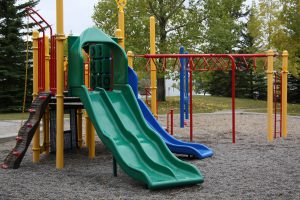
Recent research shows that our brains don’t finish developing until around age 25.¹ Children’s emotional, physical, mental, and social skills develop tremendously as they get older. Many developmental skills can be improved through physical activity. Find your child’s age below and try the corresponding activities with your child. These activities can help your child grow and develop while also getting their 60 minutes of daily physical activity!
6 to 18 months (Infants)
- Hiding games can help improve infants’ working memory. Hide a toy under a small cloth or blanket and once they can find it, try hiding it elsewhere and show them that it’s not under the cloth. You may be able to play hide-and-seek with older infants, or try hiding an object without them seeing and have them find it.
- Take turns doing an activity your older infant is interested in, such as picking up toys and cleaning. Children at this age often imitate what they see you do, so you can encourage them to participate in activities such as these that get them moving and work their muscles.
- Simple hand movements help infants develop self-control and memory. Try movements such as “Itsy Bitsy Spider.”
18 to 36 months (Toddlers)
- Use materials like balance beams, balls, ramp inclines, etc. to help toddlers learn new physical skills. You can even create an obstacle course with objects such as these!
- Older toddlers can try imitation games like “Follow the Leader.” As the leader, you can have your children do simple physical activities such as walking, running and jumping.
- Games like “Freeze Dance,” “Popcorn,” and “Ring Around the Rosie” are active and promote active inhibition.
- Songs with movements such as “The Hokey Pokey,” “I’m a Little Teapot,” and “Head, Shoulders, Knees, and Toes” improve children’s working memory as the songs guide their actions.
- Simple hand movements help toddlers develop self-control and memory. Try movements such as “Itsy Bitsy Spider.”
3 to 5 years old (Preschoolers)
- Encourage children to tell stories using their imagination and use physical movements to act out the story.
- Use materials like climbing structures, balance beams, see saws, etc. to help preschoolers learn new physical skills. You can even create an obstacle course with objects such as these!
- Quieter activities such as yoga and using a balance beam require children to focus their attention.
- Games like “Freeze Dance,” “Popcorn,” and “Ring Around the Rosie” are active and promote active inhibition.
5 to 7 years old (Younger School-Aged Children)
- Games like “Freeze Dance,” “Musical Chairs,” “Red Light, Green Light,” and “Duck, Duck, Goose,” and “Simon Says” are active and promote active inhibition. Also, “Mother May I?” and “What Time Is It, Mr. Fox?” promote mental tracking and challenge working memory.
- Four square, dodgeball, and tetherball help children learn rule-following, self-control, and fast decision-making.
- Children can start getting involved in structured physical activity such as organized sports. Sports can improve coordination and attention skills. Yoga and Tae Kwon Do are especially helpful in developing attention and control.
- Playing “I Spy” while walking incorporates physical activity and requires children to think and pay attention.
7 to 12 years old (Older School-Aged Children)
- Dancing can help children with self-monitoring, memory, and attention.
- Children can start getting involved in structured physical activity such as organized sports. Sports can improve coordination and attention skills. Yoga and Tae Kwon Do are especially helpful in developing attention and control.
- Jump rope and its related games (double Dutch, Chinese jump rope, etc.) are great aerobic exercise that also help develop working memory and attention.
- Hiding and tag games are active and promote inhibition and fast reaction times.
Adolescents (Teenagers)
- Adolescents may prefer competitive sports to games and activities they used to play. Organized sports help teens make quick decisions and respond to play while providing a great aerobic workout.
- Yoga and meditation promote a longer attention span while improving physical flexibility and reducing stress.
To learn more activities to help your child grow, visit http://developingchild.harvard.edu/wp-content/uploads/2015/05/Enhancing-and-Practicing-Executive-Function-Skills-with-Children-from-Infancy-to-Adolescence-1.pdf.
Can you think of other activities that challenge both the mind and body?
References